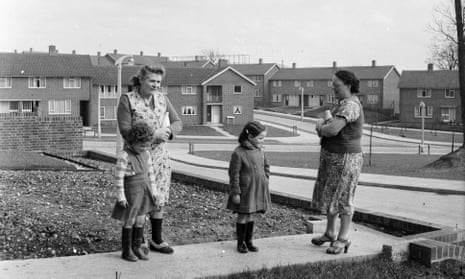Remember when everyone left doors unlocked and borrowed cups of sugar? No? Then this richly researched history of community may well appeal. Jon Lawrence uncovers the reality behind romantic cliches of our postwar past. He convincingly suggests that the real history of community is one in which people have combined solidarity with self-reliance and privacy.
This isn’t a new conclusion, as Lawrence acknowledges – his copious notes are a valuable guide for anyone interested in the social histories he draws on. But Me, Me, Me? takes an intriguing route to explore how the myth of community was constructed, and how it might be dismantled. The book revisits several social investigations – ranging from an inner-city area designated for slum clearance to a former mining village – conducted between the 1950s and the 2000s. One of Lawrence’s most vital points is that policymakers and journalists derive their nostalgic notions of “community” from a partial understanding of these studies. A closer reading reveals discontent with overcrowded conditions, frustration at prying neighbours and the hopelessness of poverty. Ambitions were real, people were active and many welcomed the chance to move to spacious housing in the suburbs.
He makes his case with great clarity. Apposite quotations bring the survey respondents to life. He draws our attention to contrasts between regions and generations (sadly there is less examination of the differences between men’s and women’s experiences). Me, Me, Me? challenges the notion that a “typical” working-class community ever existed.
Contrary to popular assumption, many older people wanted not only to live apart from their children but at a considerable distance from them. Mrs Whiteside, who lived in Bethnal Green in the 50s, complained that her daughters “come to me with all their troubles … about having no money”. This corroborates the argument made by the historian Pat Thane, who has shown that most pensioners prefer to retain their independence in old age rather than rely on their families for care. It also reinforces Lawrence’s central point: that people want to exercise independence while relying on the wider community for amenities they can’t provide for themselves.
Moving out of the inner city was not always experienced as loss. An illuminating chapter on Stevenage shows how new towns fostered ambition and opportunity in an era of strong local government and a generous welfare state. The Guardian’s Gary Younge, one of Stevenage’s most famous sons, would agree. He has described how he benefited from the lack of institutional racism in the town, due to the youth of its civic institutions and the optimism with which they were imbued.

The book begins with the author’s parents – their journey from inner-city Bristol manual work to suburban shopkeepers. Lawrence points out the distortions of memory that characterise oral histories and memoirs, but their story reveals how aspirations – to own a house or a business, join a trade union or get an education – are shaped by context. In the early 50s they were living in overcrowded conditions with relatives, and “all that mattered was to get a house”. They “saw little difference” between a council tenancy or a mortgaged house, and ended up as home owners only because private housing was more readily available. Most people want the ability to live with who they want, in security and a degree of privacy and comfort. In the 50s, both the private and public sector promised the kind of house they wanted. By the 80s, public spending cuts and rising rents meant council housing was no longer so attractive, encouraging the desire for home ownership. But a decade later, many of those who’d exercised the right to buy their council house were facing repossession. As Lawrence argues, politics must focus on providing people with what they need.
Most of the postwar researchers focused on the home and street but ignored the importance of work – not only as a means to make ends meet, but as a site of collective life, most prominently through trade unionism. The attention they paid to neighbours and relatives meant few of them examined relationships with employers, landlords or policymakers (Richard Brown’s study of Tyneside’s shipbuilding workers is a notable exception). As a result, they did not foresee the militant workplace activism of the late 60s, or the rent strikes of the 70s.
Often dismissed as the actions of minorities, these episodes are as central to the history of community as the aspiration to own a three-piece suite. This isn’t Lawrence’s concern – he perhaps has some sympathy with the version of working-class community upheld by his “respectable” mother, who refused to enter the local air raid shelter in the second world war because “rough” families used it, and who, with her husband, set her sights on business ownership as a means of bettering herself. But the later chapters of Me, Me, Me? hint that 21st-century politicians’ appeals to “community” and “social inclusion” are a poor substitute for the older commitment to trade unions, cooperatives and the welfare state, which made possible the self-reliance valued by Lawrence’s subjects. As his pithy postscript suggests, in Brexit Britain we need to make democratic participation into a more meaningful exercise than casting a ballot every few years.
